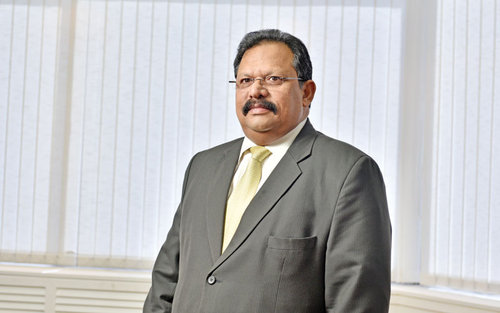OMAN’S REMITTANCES MARKET WILL REBOUND ALONG WITH ECONOMIC GROWTH
In an interview Tonny George Alexander, director at Oman-UAE Exch-ange Centre talked about the company’s operations and market position in the sultanate. He believes Oman’s remittances market will rebound along with the economic growth of the country. Alexander said the technological advancement is imperative and adapting the business to rapid changes in technology is a big challenge ahead of the company.

Can you tell us briefly about Oman-UAE Exchange’s history and operations in the Omani market?
Oman-UAE Exchange started operations in the sultanate in October 1995. The decision was taken by the higher management and shareholders of the company to enter Oman’s market. We wanted to expand our operations beyond the borders of the UAE and were trying out different countries. Fortunately, Oman was the first country where we received the nod.
Gradually, we expanded operations in every part of Oman. We now have 56 branches, making us the largest remittance service provider in the country. It is difficult to imagine how the company used to operate in those days when there was no Internet-banking and SWIFT was not also widely used in the Indian subcontinent, which accounts for the majority of expatriate population working in the Gulf region.
It would be wrong to say that SWIFT wasn’t there, but most branches of banks in the Indian subcontinent were not directly linked to the network. UAE Exchange became live on SWIFT way back in 1994. When you look closely, you will find that money transfer business has evolved in past two decades. When I joined UAE Exchange 30 years back, the only way of transferring money, specially to the Indian subcontinent, was a bank-draft and sending it through post. This used to take a very long time to reach the destination. However, at the same time banking system in the western countries was far ahead in technology and it was easy to transfer money there.
How the transformation from paper-based drafts to electronic transfers become a reality, was there any trigger point?
UAE Exchange always aspired to be a pioneer in customer service and strive to bring better ways to serve the customers. Certain factors also contributed in this transformation. For example, in 1993, when India (mainly Surat city) was hit by plague, all flights to India from the Gulf were suspended which led to the complete stoppage of postal service. There was no way to send bank drafts to India directly from the GCC region. In order to help our customers, we had to rope-in international courier companies to ship drafts to India via London. With this facility, we could help our customers send drafts for nominal charges. That eventually inspired us to look for alternative methods to transfer money to India.
As a next step, we managed to get a license from the Reserve Bank of India (RBI) to print drafts in India, enabling us to send the data electronically and print the drafts in India. That was an innovation at that time. So, when we came to Oman that was one of our major products. We could deliver drafts anywhere in India within 48 hours.
Gradually, things kept improving with the IT revolution that took place in the early 2000s. Due to the advent of Internet, things have become much easier now. Banks also started using Internet as a platform for transaction processing which helped in reducing costs and making services more and more affordable for everyone.
Many companies are competing in remittances segment in the market, what makes your company different from competitors?
Our service is always a differentiating factor. The second one is that we always advocated thinking ahead of the time. For example, when no other company was interested in opening a branch in locations such as Ghala; we were the first one to open there. Similarly, there are many locations in the sultanate where Oman-UAE Exchange was the first company to open branches. For us, it is not just a matter of money or profit alone. We believe that we are in the market to provide services to our customers, and the profit generated is only a by-product of our actions. So, in many locations such as the PDO camp in Marmul, we opened our branch mainly for providing services to the people because a lot of people working there were facing difficulties in sending money to their loved ones.
Does your business also get impacted by the ups and downs in oil prices?
The country is dependent on crude oil, so when prices fall, every business including us get impacted by it. Similarly, if the market is doing well our business also do well. But one should remember these are cyclic in nature, and the market goes up and it comes down also.
What is your outlook for Oman’s remittances market in near future?
As mentioned earlier, the economic slowdown is cyclical and we are confident of the government’s prudent measures. We believe that the government will be able to come out of this slowdown, as it has done in the past. The remittances market is no way different from other businesses and we are confident our business will also rebound along with the economy.
What challenges do you anticipate in the near future that could make things difficult?
Technological advancement is imperative. Adapting business to the rapid changes in technology is a big challenge ahead of us. For example, until a few years ago, selling foreign exchange was a flourishing business. But with the growing popularity to plastic money or cards, that business is slowly coming down. Similarly, at one time, travellers cheques was a booming business but now no one talks about it. Keeping abreast with the advancement in technology would be the biggest challenge which everyone in any business will face in the future.
This interview first appeared here